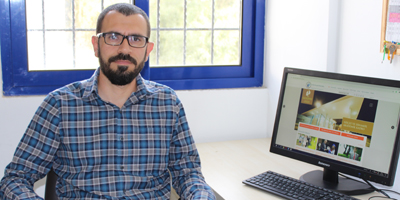The new article of EUL agriculture faculty academicians has been published in the journal Critical Reviews in Food Science and Nutrition

The article, titled “Improving the safety and security of fruits and vegetables during the COVID-19 outbreak through post-harvest processing”, which was authored by, Dean of European University of Lefke (EUL) Faculty of Agricultural Sciences and Technologies Prof. Dr. M. Atilla Askin and Assoc. Prof. Dr. İbrahim Kahramanoğlu, Assist. Prof. Dr. Serhat Usanmaz, Assist. Prof. Dr. Turgut Alas, Assist. Prof. Dr. Murat Helvacı and Assoc. Prof. Dr. Volkan Okatan from Eskişehir Osmangazi University, and foreign academics Prof. Dr. Chunpeng-Wan, Prof. Dr. Chuying Chen and Prof. Dr. Kannan R.R. Rengasamy, was published in the journal “Critical Reviews in Food Science and Nutrition”.
Providing information about the publication, Kahramanoğlu stated that the starting point of the research was the problems experienced in production and food security during the pandemic period. Kahramanoğlu also noted that as a result of the problems experienced in production, many countries made some restrictions on exports by saying “his own citizens first”, and that food security was endangered due to the closures. Stating that two important goals emerged as a result of this, Kahramanoğlu underlined that these are ensuring self-sufficiency in production and reducing post-harvest food losses. Providing brief information about the article, Kahramanoğlu said:
The world has been struggling with the problem of food insecurity for decades and it seems that food insecurity will continue to be the world’s most important problem in the future. The pandemic period has made this problem, which has existed for years, more clearly understood by mankind. According to the latest data, the human population has more than tripled in the last 70 years, from the 1950s to the present. Primary horticultural and field crops, including fruits, vegetables, grains and root crops, make up about 70% of the world’s human food supply (kg/person/year). According to the United Nations reports, the human population in the world will reach 10-11 billion by 2050. According to the data of the World Food and Agriculture Organization (FAO), in order to feed the world population in 2050, the amount of fruits and vegetables produced today will need to be increased by 48-54% and the amount of grains by 39-56%. In particular, due to diminishing water resources, barren/constructed soils, damaged biodiversity and other problems, a decrease in productivity is observed instead of an increase.
On the other hand, people’s food demand (wants) differs significantly from people’s actual needs and is mainly driven by the media. Recent research shows that social media and norms about social approval significantly influence consumers’ buying and eating behavior. This is also closely related to the income and status of countries. While it is estimated that around 800 million people worldwide are starving, it is also estimated that about the same number of people in different countries are overweight or obese. It is also well known that the soil and climatic conditions of the countries are different and the food supply in the world is mainly controlled by international trade. Therefore, both consumption and production patterns are among the main determinants of food safety.
Under these circumstances, if the crop production of countries cannot be increased or is under stress, the best alternatives may be to change consumption habits, include edible wild plants in consumption and improve storability.
Finally, Kahramanoğlu mentioned the following about the study: The COVID-19 epidemic damaged the world economy in the 2020-2021 period, reduced the purchasing power of households, partially restricted international movements and trade (including food products), and harmed crop production. This has caused uncertainty in the food business and food supply shocks. According to some scientists, business people and politicians, this is a precursor and a warning for humanity to change its lifestyle by focusing on sustainable measures to prevent damage to natural ecosystems. This article focuses on the significant effects of the COVID-19 pandemic on crop production and some preventive measures. It has been scientifically confirmed that post-harvest losses of fruits and vegetables are around 10-15% in developed countries and around 20-40% in developing countries, and higher in some special crops. Reducing these losses will also help the world cope with food supply shocks during the COVID-19 pandemic and traditional conditions to also reduce the pressure on natural resources.
